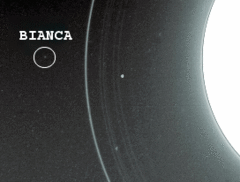Bianca (moon) facts for kids
| Discovery | |
|---|---|
| Discovered by | Bradford A. Smith / Voyager 2 |
| Discovery date | January 23, 1986 |
| Orbital characteristics | |
|
Mean orbit radius
|
59,165.550 ± 0.045 km |
| Eccentricity | 0.00092 ± 0.000118 |
| 0.434578986 ± 0.000000022 d | |
| Inclination | 0.19308 ± 0.054° (to Uranus' equator) |
| Satellite of | Uranus |
| Physical characteristics | |
| Dimensions | 64 × 46 × 46 km |
|
Mean radius
|
27 ± 2 km |
| ~8300 km² | |
| Volume | ~71,000 km³ |
| Mass | ~9.2×1016 kg |
|
Mean density
|
~1.3 g/cm³ (assumed) |
| ~0.0086 m/s2 | |
| ~0.022 km/s | |
| synchronous | |
| zero | |
| Albedo | 0.08 ± 0.01 |
| Temperature | ~64 K |
Bianca is a small moon that orbits the planet Uranus. It is one of the inner moons of Uranus. Scientists first spotted Bianca in pictures taken by the Voyager 2 spacecraft. This happened on January 23, 1986.
Discovery and Name
When Bianca was first found, it was given a temporary name: S/1986 U 9. Later, it was officially named Bianca. This name comes from a character in William Shakespeare's play The Taming of the Shrew. Bianca is the sister of Katherine in the play. It is also known as Uranus VIII.
Bianca's Family (Portia Group)
Bianca is part of a group of moons called the Portia Group. This group includes other moons like Cressida, Desdemona, Juliet, Portia, Rosalind, Cupid, Belinda, and Perdita. These moons travel in similar paths around Uranus. They also look alike when seen through telescopes.
What Bianca Looks Like
Not much is known about Bianca besides its orbit and size. It has a radius of about 27 km. This means it is a fairly small moon. Its surface is quite dark, reflecting only about 8% of the sunlight that hits it. This is called its geometric albedo.
In the pictures taken by Voyager 2, Bianca looks stretched out. Its longest side points directly towards Uranus. This shape is common for small moons orbiting close to a large planet. The surface of Bianca appears to be grey in color.
See also
 In Spanish: Bianca (satélite) para niños
In Spanish: Bianca (satélite) para niños


